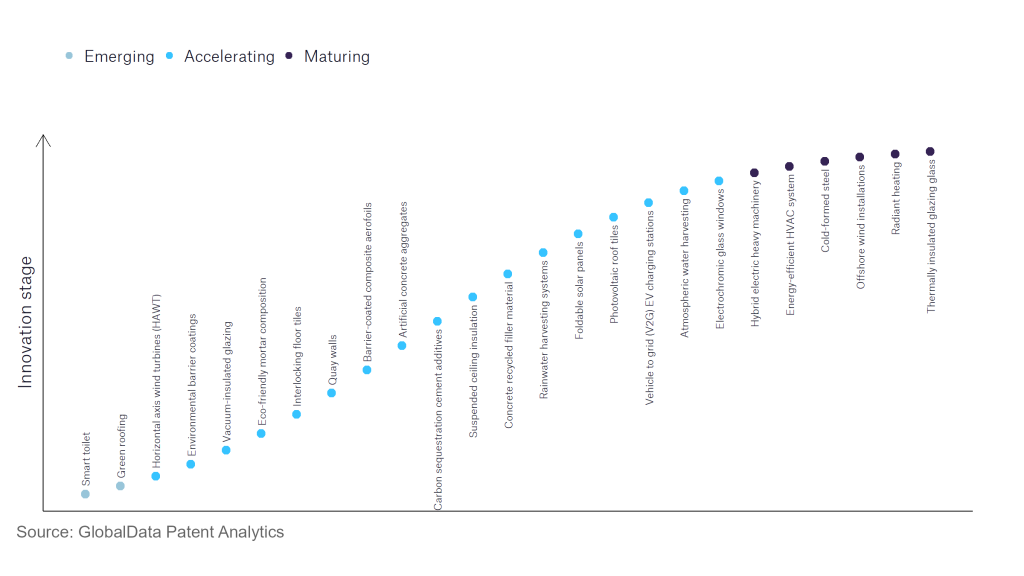The construction industry continues to be a hotbed of innovation, with activity driven by an increased focus on environmental sustainability and workplace safety, and the growing importance of technologies such as the Internet of Things (IoT) and robotics]. In the last three years alone, there have been over 248,000 patents filed and granted in the construction industry, according to GlobalData’s report on Environmental sustainability in Construction: Smart toilet. Buy the report here.
However, not all innovations are equal and nor do they follow a constant upward trend. Instead, their evolution takes the form of an S-shaped curve that reflects their typical lifecycle from early emergence to accelerating adoption, before finally stabilising and reaching maturity.
Identifying where a particular innovation is on this journey, especially those that are in the emerging and accelerating stages, is essential for understanding their current level of adoption and the likely future trajectory and impact they will have.
80+ innovations will shape the construction industry
According to GlobalData’s Technology Foresights, which plots the S-curve for the construction industry using innovation intensity models built on over 179,000 patents, there are 80+ innovation areas that will shape the future of the industry.
Within the emerging innovation stage, smart toilets and green roofing are disruptive technologies that are in the early stages of application and should be tracked closely. HAWT wind turbines, environmental barrier coatings, and vacuum-insulated glazing are some of the accelerating innovation areas, where adoption has been steadily increasing. Among maturing innovation areas are hybrid electric heavy machinery and energy-efficient HVAC system, which are now well established in the industry.
Innovation S-curve for environmental sustainability in the construction industry

Smart toilet is a key innovation area in environmental sustainability
Smart toilets incorporate technology into the bathroom plumbing fixture and can include features such as adjustable water spray systems for bidet facilities, automatic flushing, automatic seat opening and closing, lighting systems, and seat warming functions. Smart toilets can be environmentally friending, by reducing water usage and the use of toilet paper, and allow for greater accessibility for people with disabilities.
GlobalData’s analysis also uncovers the companies at the forefront of each innovation area and assesses the potential reach and impact of their patenting activity across different applications and geographies. According to GlobalData, there are 10+ companies, spanning technology vendors, established construction companies, and up-and-coming start-ups engaged in the development and application of smart toilet.
Key players in smart toilet – a disruptive innovation in the construction industry
‘Application diversity’ measures the number of different applications identified for each relevant patent and broadly splits companies into either ‘niche’ or ‘diversified’ innovators.
‘Geographic reach’ refers to the number of different countries each relevant patent is registered in and reflects the breadth of geographic application intended, ranging from ‘global’ to ‘local’.
Patent volumes related to smart toilet
| Company | Total patents (2021 - 2023) | Premium intelligence on the world's largest companies |
| Toto | 102 | Unlock Company Profile |
| Kohler | 37 | Unlock Company Profile |
| Panasonic | 36 | Unlock Company Profile |
| Coway | 31 | Unlock Company Profile |
| LIXIL | 16 | Unlock Company Profile |
| Woongjin Coway | 15 | Unlock Company Profile |
| Kohler Novita | 14 | Unlock Company Profile |
| Geberit | 9 | Unlock Company Profile |
| Whole Bath | 8 | Unlock Company Profile |
| Sensor Electronic Technology | 7 | Unlock Company Profile |
| Grifols | 5 | Unlock Company Profile |
Source: GlobalData Patent Analytics
Toto is a leading filer in the smart toilet sector. The company’s centrepiece technology is WASHLET, which it claims is the original shower toilet from Japan. It features technologies and functionalities that provide high levels of hygiene and comfort. Other leading filers include Kohler, which has a range of smart toilets, including Numi 2.0, Eir, Innate and Veil intelligent toilets, which include a range of technological features from heated seats to built-in nightlights.
In terms of application diversity, Panasonic is a leading player. Among its recent developments, Panasonic developed an IoT toilet that measures body fat percentage and analyses urine. By means of geographic diversity, Geberit is among the leaders. Geberit’s AquaClean toilets have patented WhirlSpray shower technology and an intuitive remote control.
To further understand the key themes and technologies disrupting the construction industry, access GlobalData’s latest thematic research report on Construction.
Data Insights
From

The gold standard of business intelligence.
Blending expert knowledge with cutting-edge technology, GlobalData’s unrivalled proprietary data will enable you to decode what’s happening in your market. You can make better informed decisions and gain a future-proof advantage over your competitors.



